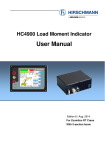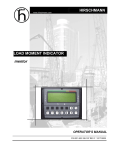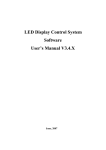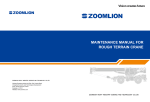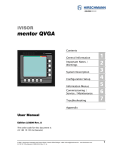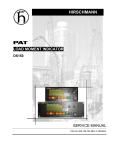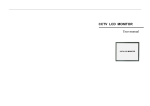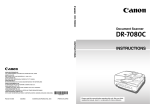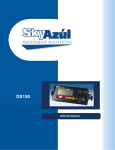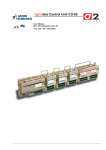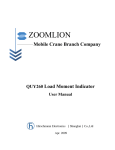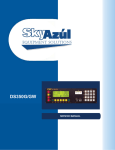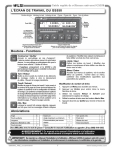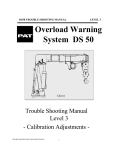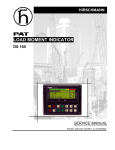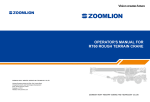Download User Manual - Global Cranes
Transcript
HC4900 Load Moment Indicator User Manual Edition 5 / July, 2014 For Zoomlion RT Crane With 4-section boom Copyright ©2010 by Hirschmann Electronics(Shanghai)Co., Ltd This document contains propriety information which is protected by copyright law. All rights reserved. The manual may not be copied, reproduced or translated into another language, neither whole nor in part, without advance written authorization from Hirschmann. Edition 5 on July 2014 Reproductions must abide by the copyright law. Declaration The manufacturer reserves the right to modify the contents of this manual without notice. Hirschmann offers no guarantee whatsoever for this material, including guarantees with reference to commercial availability and suitability for particular applications. Hirschmann shall not be liable for errors contained herein or for identical or consequential damages in connection with the furnishing, performance, or use of this manual. Hirschmann Electronics(Shanghai)Co., Ltd Suite 10K, Huamin Empire Plaza, No.728, West Yan An Road, Shanghai, P.R.China Tel: 021-51082780 Fax: 021-52375899 Zip code: 200050 Website: http://www.hirschmann-ac.com Catalogue 1. GENERAL INFORMATION ................................................................................ ‐ 1 ‐ 2. WARNING ...................................................................................................... ‐ 2 ‐ 3. SYSTEM CONFIGURATION ............................................................................... ‐ 3 ‐ 3.1 HC4900 CONTROLLER ................................................................................... ‐ 4 ‐ 3.2 IC4600 CONSOLE ......................................................................................... ‐ 4 ‐ 3.3 DAVS PRESSURE TRANSDUCER ......................................................................... ‐ 5 ‐ 3.3.1 Technical data ................................................................................ ‐ 5 ‐ 3.3.2 Installation ..................................................................................... ‐ 5 ‐ 3.4 LWG208 LENGTH/ANGLE SENSOR .......................................................... ‐ 6 ‐ 3.4.1 Technical data ................................................................................ ‐ 6 ‐ 3.4.2 Installation ..................................................................................... ‐ 6 ‐ 3.5 ANTI-TWO BLOCK SWITCH ....................................................................... ‐ 8 ‐ 3.5.1 Technical data ............................................................................ ‐ 8 ‐ 3.5.2 Installation .................................................................................. ‐ 9 ‐ 4.OPERATION AND DISPLAY INTERFACE .......................................................... ‐ 10 ‐ 4.1 DATA DISPLAY INTERFACE(VALUES ARE NOT REAL)........................... ‐ 11 ‐ 4.2 UTILIZATION DISPLAY (BAR GRAPH) ....................................................... ‐ 13 ‐ 4.3 INDICATOR LIGHT ................................................................................... ‐ 13 ‐ 5. OPERATION METHOD .................................................................................... ‐ 15 ‐ 5.1FUNCTION SETTING ................................................................................. ‐16‐ 5.2 OM SETUP ............................................................................................. ‐ 16 ‐ 5.3 REEVING SETUP .................................................................................... ‐ 19 ‐ 5.4 ERRO CODE REFERENCE TABLE ........................................................... ‐ 20 ‐ 5.5 BUZZER STOPPING ................................................................................. ‐ 21 ‐ 6. LMI SYSTEM FUNCTIONS ............................................................................... ‐ 23 ‐ 6.1 WARNING .............................................................................................. ‐ 23 ‐ 6.2 PROHIBITION ......................................................................................... ‐ 23 ‐ 7 DAILY MAINTENANCE AND CALIBRATIONS ...................................................... ‐ 24 ‐ 7.1 MAINTENANCE CONTENT ........................................................................ ‐ 24 ‐ 7.2 LENGTH SENSOR ADJUSTMENT .............................................................. ‐ 24 ‐ 7.3 ANGLE SENSOR ADJUSTMENT ................................................................ ‐ 25 ‐ 7.4 BUZZER ALARMING ................................................................................ ‐ 25 ‐ 7.5 LENGTH CABLE RETRACT UN-SMOOTHLY ............................................... ‐ 26 ‐ 7.6 QUESTION AND ANSWER ....................................................................... ‐ 26 ‐ 8. HINTS AND TROUBLE SHOOTING ................................................................... ‐ 28 ‐ 9. HC4900 CONNECTING DIAGRAM ................................................................... ‐ 34 ‐ 10. OM LIST ...................................................................................................... ‐ 35 ‐ 1. GENERAL INFORMATION HC4900 Load Moment Indicator (LMI) provides effective information to operators, which will assist an operator maintain a machine to work within its design parameters. LMI provides the operator with the information of the length and angle of the boom, tip height, working radius, rated load and the actual load weight and so on. Using various sensing devices, the load moment indicator monitors machine’s various operational functions and provides the operator with a continuous reading of the machine’s capacity. The readings change continuously in response to the different operations of the machine. If forbidden conditions are approached, the HC4900 Load Moment Indicator will warn the operator by sounding an audible alarm, lighting a warning light and locking out those functions that may aggravate the machine’s condition. This user manual is used for Zoomlion RT crane with a 4-section boom. -1- 2. WARNING The LMI control system is used to assist in the safe operation of the crane by warning crane operator of approaching overload conditions and of over-hoist conditions that could cause damage to equipment and personnel. The device is not, and shall not, be a substitute for good operator judgment, experience and use of accepted safe machine operating procedures. Caution Safe operation is the responsibility for every machine operator. Every machine operator must ensure that they read all warnings and instructions carefully and fully understand the contents. Correct operation depends on daily careful checking and serious study of the Manual. Warning The LMI is not able to provide aid to the machine operator unless it has been properly adjusted and unless the correct load capacity chart and the correct operating code have been entered for the respective rigging configuration. The correctness of the LMI setups must be ensured before beginning machine work in order to avoid damage to property and severe or even fatal injuries to personnel Warning If the LMI fails or is not functioning properly, stop the operation of the crane immediately and contact an expert service engineer. Hirschmann Electronics Co., Ltd. does not assume any responsibility for undesirable consequences resulting from continued use of the crane if the LMI is not functioning! Caution Hirschmann Electronics Co.,Ltd. shall not be liable for damages caused by welding crane without power off the controller. Hirschmann Electronics Co.,Ltd. shall not be liable for damages caused by power on the controller at a thunderstorm weather. -2- 3. SYSTEM CONFIGURATION Cable connection HC4900 LMI System configuration HC4900 LMI system comprises a HC 4900 central unit with an IC 4600 console together with various sensors to record the measured values. The system operates on the principle of reference/real comparison. The actual value is compared with the calculated reference values and evaluated by the system. An overload warning signal is triggered on the display and operating console once limit values are reached. All machine movements that increase the load moment are switched off at the same time. The crane-specific data specified by the manufacturer, such as load capacity charts, boom weights, centers of gravity and dimensions, are stored in the central data memory. This data is the reference information used to calculate the operating conditions. The boom angle and length is measured by means of length and angle sensors that are mounted on the boom. The crane load is determined indirectly with the aid of pressure transducers. -3- 3.1 HC4900 Controller HC4900 controller features high-performance, precise and limiting load moment function in harsh environment. Technical data: System clock: 40MHz Program memory: 16MB Flash Protection class: IP65 Communication interface: 1×CANopen1×RS232 Operating voltage: 12V~30VDC Operating temperature: -20°C~ +70°C Storing temperature:-30°C~+80°C HC4900 controller dimension 3.2 IC4600 Console IC 4600 monochrome console is designed for outdoor construction vehicles and mobile machinery. It complies with international standards for environmental testing, EMC testing, and CE certification. Its easy programming, convenient online debugging, and rich paint library functions (point, line, arc, rectangle, progress bar, virtual instrument panel, such as function) help you to more efficiently understand and utilize the LMI system. Technical data: Operating voltage: 12~36VDC Operating temperature: -20°C~+70°C Storing temperature: -30°C~+80°C Resolution: 320*240(monochrome) Communication interface: 1×RS232, 1×CANopen Protection class: Front IP65 Back IP44 IC4600 Console dimension -4- 3.3 DAVS Pressure transducer DAVS pressure transducers measure high static and dynamic pressure values of liquids or gases in rough operating environment. Measurement precision is maintained even during continuous operation at extremely dynamic pressure. The oil pressure transducer comes with a pressure connector with standardized G1/4 thread or other hydraulic connectors. 3.3.1 Technical data Operating voltage: 8~32VDC Signal: CANopen Operating temperature:-40°C~+85°C Storing temperature: -40°C~+100°C Protection class: IP67 Life expectancy: >10 million cycles Hysteresis tolerance: 〈±0.1%FS max. DAVS Dimension 3.3.2 Installation Please notice the location of hydraulic piping and valve when installing the pressure transducer. By thread connection (such as follow graph), screw the pressure transducer in the hydraulic piping or seat of the balancing valves or hydraulic valves. Add the appropriate seal to the display to prevent oil leakage. Guarantee the installation position is safe and easy for cable connecting. Make sure the pressure sensor and hydraulic adaptor connect tightly. The tightening moment of G1/4 connector is 20Nm Pressure transducer installation connector pin assignment -5- 3.4 LWG208 Length/Angle sensor LWG series Length/Angle sensor can be directly installed and can precisely measure the angle and the length of boom with largest measurement length of fifty meters. The sealed housing protects the inside components from water inclusion, humidity etc. 3.4.1 Technical data Operating voltage: 15~30VDC Operating temperature: -25°C~ +75°C Storing temperature: -40°C~ +80°C Protection class: IP65 Linearity tolerance: 〈±0.2° Resolution: 〈±0.1° Hysteresis tolerance: 〈±0.1° LWG208 Length/angle sensor dimension 3.4.2 Installation Length/Angle sensor is installed on the main boom. Manufacturers can fix the bracket of the sensor to the crane boom by welding tap blocks and bolting it in place. When installing the sensor, the position shall be well considered, generally along the foot points of boom to the top direction. The sensor (left type) is typically installed on the left of the boom (aligned with the cab) to leave room for the fly (jib) on the right side of the boom. The sensor can be located on the right side as required. The cover can be turned 180° to put the PAT name facing upward. -6- A Bracket LWG208 Length/angle sensor installation Length/Angle sensor consists of housing, a spring-loaded cable drum with measuring cable and mounting equipment. Make the boom horizontal. Make sure the sensor is parallel with the main boom and the bracket is straight before fixing the bracket by bolts. Make sure there are at least two turns measuring cable in the drum when the cable is pulled out. The recommended length of the cable = effective needed measure length + two turns cable+ about 1 meter cable for connection. The cable drum of the sensor must rotate following the direction of the cable being pulled out. Rotate the cable drum 4 to 5 turns to pre-tighten the drum and then pull out the cable to the tip of the boom for connection. Use the guiding wheel to keep the measuring cable at the same level. Place guiding wheels so as to prevent cable deflection, which will result in the cable being difficult to pull out and to retract smoothly: o Make sure the first guiding wheel A is in front of the sensor center 1.5m~2m. Ensure the guiding wheel turn width is slightly less than or equal to the cable drum turn width. o Make sure the center of the cable guiding wheel A and other wheels are in alignment and also parallel with the main boom. The measuring cable should be fixed to the tip of the boom tightly and the fixed point should be at the same level with the sensor center to guarantee -7- the cable is parallel with the boom. The Length/Angle sensor sometimes needs to be adjusted. Press the cable drum line to make the cable drum plane parallel with the boom plane. Rotate the cable drum and observe until the swing get smaller amplitude. If the cable drum swing too much because of the shape distortion and can’t be adjust, please stop the installation and repair or replace the Length/Angle sensor. Make sure the spring force of the measuring cable is sufficient and the cable drum is rotating smoothly after installation is completed. If the measuring cable is already at the pre-tighten length when boom is retracted, the pre-tighten turns can be reduced. 3.5 Anti-two Block Switch Anti-Two Block Switch is a normally open limit switch for winches, lifting devices and cranes. It is a simple, direct installation and compact design. The sealed housing protects the inside components from water inclusion, humidity etc. 3.5.1 Technical data Operating voltage: 15~30V Operating voltage: -25V~+70V Storing temperature: -40 ~+70 Protection class: IP67 Life expectancy: >5×106 times Housing: aluminum Weight: 1.2kg A2B Switch dimension -8- 3.5.2 Installation The switch should be installed on the side of boom head where the beginning of the lifting rope is fixed. Make sure the hammer is connected to the lifting rope and is free to actuate the switch. The signal connector and cable must be waterproof and connected correctly. A2B Switch installation diagram -9- 4.OPERATION AND DISPLAY INTERFACE 2 1 3 4 5 1. Data display(background lit) 2. Bar graph(utilization) 3. Indicator light (refer to 4.3) 4. Function keys:Function keys F1-F5 are related to the key symbols which present on the display 5. Numerical keys:They can be used to input values or select function items in accordance with the number on the display. Note:At the main interface, numerical key 1 and 3 can calibrate the brightness of the console. - 10 - Operation notice: 1. OM can only be switched when the boom is fully retracted. 2. Under the load lifting status of the RT crane, the OM switch between 360 lifting and front lifting is automatically done by the LMI based on the rotating field of the boom. 3. LMI bypass icon will be displayed on main interface if bypass switch is activated. The status will be displayed for 30 minutes and then automatically close. To cancel the LMI bypass condition, deactivate the bypass signal. 4.1 Data display interface(values are not real) The Data display (320×240) is an LED display with background illumination and extended temperature range, on which essential data are displayed. The data is dependent on the operating mode, such as load values, geometry and crane data, symbols, etc. 1 3 4 2 5 7 11 6 a 19 9 10 12 b c 15 13 16 14 18 17 d e Main interface (values shown are for illustration): - 11 - Data display: 1. Load moment percentage bar graph 2. Load moment percentage displayed value 3. OM code 4. Reeving 5. Rotary angle 6. Outrigger mode 7. Rid pressure 8. Piston pressure 9. Operating height 10. Time (error code will be displayed when defect) 11. Wind speed 12. Fixed jib boom length 13. Main boom length 14. Main boom angle 15. Fixed jib boom angle 16. Rated load capacity 17. Actual load 18. Working radius 19. Enforced icon (OEM special requirement) Icon Key symbols definition: a. Function setting key (refer to 5.1) b. OM setting key (refer to 5.2) c. Reeving setting key (refer to 5.3) OM setting key d. Error code information key (refer to 5.4) e. Alarm off key (refer to 5.5) - 12 - 4.2 Utilization display (bar graph) The Utilization display (bar graph) indicates how much of the admissible load moment (rated moment) is used. As the rated moment changes constantly during load operation, the load moment display also changes constantly. The utilization display is marked with differently colored fields: Green: "Safe” operation (0...90% of rated moment) Yellow: “Pre-warning range” (90...100% of rated moment) Red: (> 100% of rated moment) “Overload range” 4.3 Indicator light Pre-warning lights This yellow pre-warning light comes up when the load on the machine amounts to more than 90% of the respective maximum carrying capacity, which indicates that an overload situation is immediately pending. For the operator, this means that the machine work can continue only with the greatest amount of caution. Overload warning light This red Overload warning light indicates to the machine STOP operator that an overload condition has occurred. It lights up when the crane load has reached 100% of maximum load carrying capacity permitted for the current operating status. The acoustic alarm sounds. The load-moment-increasing crane movements are switched off at the same time A2B switch lamp (if the machine need) This red warning light lights up when the A2B (hoist limit) switch contacts open, i.e. when a hoist limit situation has occurred. The - 13 - acoustic alarm sounds and load-moment-increasing machine movements are switched off at the same time. An A2B (hoist limit) situation occurs when the hook block comes into contact with the boom head. The danger exists in such situations that the hoist rope will break, causing the load to fall. A hoist limit situation could arise from the load being pulled against the boom head or from the boom being extended or lowered without the hoist rope having been allowed to slacken. Test method as below: Manually lifting the weight attached to the A2B switches, then the audible alarm sound and the A2B alarm light will light. Slowly raise the hook or lower the boom or extend (telescope) the boom to create a potential two-block condition, when the hook lifts the weight, the audible alarm sound, the A2B alarm light will light and the crane movement such as hoist up, luffing down, telescopic out will be stopped. If the light and audible alarm does not function as described and the crane movements are not stopped, the system is not working properly. The malfunction shall be corrected before operating the crane. - 14 - 5. Operation method With proper adjustments, the LMI will start to work automatically. The crane operator must be very familiar with the operation of LMI system and correctly adjust it before operating the crane. Below is a diagram of the startup screens. Power On Push Y to continue If all system checks are okay, then after pushing Y (F5 button), the Set Operating Mode screen will come up. If OM is set correctly, push Y (F3 button) to confirm, then ◄┘(F5 button) to return to main screen. Otherwise set OM according to section 5.2. - 15 - 5.1 Function setting Press F1 key at the main display to enter into Function setup display: F3:Switch between Metric and Imperial units F4:Switch between English and Chinese language F5:Back to the main interface Numerical key 1:time setting Numerical key 2:CANbus status query Numerical key 3:OM code query Numerical key 4:Oil Pressure node setting Function setting interface In the metric display, the unit of length is “m” (meters) and the unit of weight is “t” (metric ton). In the imperial display, the unit of length is “ft” (feet) and the unit of weight is “kips” (lbs. x 1000). Metric and Imperial conversion relationship: 1 m = 3.2808 feet; 1 kg = 2.20462 pounds - 16 - Time and date setup Press numerical key 1 at the Function setup display to enter into time and date setup display: F1: Cursor up to select year month date hour and minute items. F2: Cursor down to select year month date hour and minute items. Input correct value of selected items by “numerical keys” F3: Confirm all entres (The current time and date would change into the new setting ones) F4: Reset the selected item zero Time and date interface F5: Back to the previous interface CAN bus status query Press numerical key 2 at the Function setup display to enter into CANbus status overview display: The “CAN bus status display” show CAN communication status of all the LMI components and the meanings of the status symbol. When any node is fault, Operators can quickly find out the defective node and defective reasons. F5 : Back to the previous interface CAN bus status query interface - 17 - OM code query Press numerical key 3 at the Function setup display to enter into OM code information display (please use the displayed actual data on console): Operators can find OM code information in accordance with every different crane operating mode, which offer great help for OM setup. F1: Enter into OM setup display (refer to 5.2) F5: Back to the previous interface OM code query interface The OM Code is comprised of four digits – ABCD A – Outrigger and Tire Configuration – number is automatically assigned during OM Setup (refer to section 10 for OM List). B – Swing Angle – number is automatically assigned based on input from swing angle sensor. 0 – Swing angle is greater than 3° but less than 357° 1 – Swing angle is between 357° and 3° NOTE: Number in B position will automatically change based on swing angle. C&D – Boom Configuration (refer to section 10 for OM List) - 18 - 5.2 OM Setup Since the working conditions of the crane are different, the LMI must be set up to represent the actual configuration of the crane. To do that, the LMI must be configured into a reprentative Operating Mode (OM) code. Before operating the crane, find out the matched OM code according to the crane type and the actual configuration, then enter the appropriate information into the LMI for: A) outrigger configuration, B) parts of line of the hookblock being used and C) boom configuration. WARNING Correctly setting the OM guarantees the proper function of the system and the crane. Only operators who are thoroughly familiar with the crane and the operation of the system are qualified for the setting the OM codes. Improperly setting the OM code in the LMI will result in false readings being displayed, which can lead to a serious accident occuring. F1: Select outrigger / tire configuration F2: Select static load lifting or creep on tires F3: Confirm OM code (After confirmation Current OM will change to Set OM) F4: Reset the OM code to zero F5: Back to the main display OM setup interface Push N (F4 button) to reset the OM code. Push Y (F3 button) once the proper configuration has been selected. See following page for outrigger / tire configuration & static load lifting or creep on tires setup. Refer to section 10 for - 19 - OM code table to look up proper code to enter for the boom configuration. Outrigger / Tire Configuration Push F1 to scroll through and select appropriate outrigger and tire configurations. On tires (No need for outriggers) NOTE: F2 must be set for either static lifting or creep, if “On tires” configuration is selected. On outriggers, extend to 0% (fully retracted) On outriggers, extend for 50% (half extended) On outriggers, extend for 100% (fully extended) Static Load Lifting or Creep on Tires Push F2 to scroll to either Static Load Lifting or Creep on Tires. NOTE: If an incorrect OM code is entered, Current OM code will change to BBBB. If this occurs, push N (F4 button) and enter a permissible code. An example of this is if On Tires and Creep are selected, but the swing angle is not ±3°, then Current OM will change to BBBB and error message will occur. 5.3 Reeving setup Reeving setting is to adjust the LMI reeving eaqul to the lifting cable of the cane. Operators shall carefully adjust the displayed reeving equal to the actual reeving before start to work. WARNING The Reeving must be set equal to the actual Reeving, otherwise the LMI may not be able to work properly. - 20 - Press F4 key at the main display to enter into Reeving setup display. F3:Confirm Reeving (After confirmation, Current REEV will change to New Reev setting) F4:Reset the Reeving to zero. F5:Back to the main display Reeving setup interface Set Reev interface To change reave setting (parts of line of chosen hookblock), push N (F4 button) to reset. Then enter the proper parts of the line of the chosen hookblock (using numeric keys). Press Y (F3 button) to confirm change. NOTE: Current REEV will change to New Reev setting. Push ◄┘ (F5 button) to return to screen. 5.4 Error Code Reference Table When the system is malfunction, the error code will appear at the main display.Through the error code information in the table, crane operators and service engineers can better understand what the error code stands for, and quickly find out the fault reasons and suggested solutions. Press F4 key at the main display to enter into error code informatoin display: F3:Scroll up for the previous error code information F4:Scroll down for the next error code information F5: Back to the main interface Error code query interface - 21 - 5.5 Buzzer stopping The buzzer of HC4900 console will alarm at the following situation: Actual load exceeds the max. rated load moment The hook is approaching height limitation (A2B fault) Exceed the operating range of the crane LMI system defective Operation fault Press F5 to stop the buzzer alarming temporarily。 Main interface . CAUTION The audible alarm is only temporarily silenced. The fault that caused the alarm to go off still exists and should be corrected immediately. The alarm will sound again if fault is not corrected or if a new fault is detected. - 22 - 6. LMI System functions 6.1 Warning Under any below conditions, HC4900 LMI system will light up and send out alarm for warning. The crane is overload or exceed operating range The hook approaching height limitation Malfunction 6.2 Prohibition If a fault occurs, the LMI system will send alarm warning and all of the following crane’s movements will be prohibited: Boom luffing down Telescope out Hoist up At this moment only the movements toward safe direction are allowed: Boom luffing up Boom retract Hoist down CAUTION When the cut-off device is activated this cut-off signal will always keep be out. Functions such as “dangerous direction operation is not allowed”, “only safe direction operation is allowed” is realized by cooperating with the crane’s electronics system which including “ safe direction inspect switch”, “safe overflow solenoid valve” etc. The LMI system cannot judge the operation is safe or dangerous itself. - 23 - 7 Daily maintenance and calibrations Please maintain and adjust as follows and contact us if you have any questions. 7.1 Maintenance Maintenance items listed below should be done daily. Check all components of the LMI system to make sure no cable is damaged or broken. Check the insulating layer of all the cables. If the insulating layer or the wire inside damaged, please replace new one immediately. Check the pressure transducers at the luffing cylinder and the connection hoses for oil leakage. Check the cable reel wire for sufficient tension. Check the cable reel mounting & torsion spring for proper function. Check the angle transducer for oil leakage. 7.2 Length sensor adjustment When the displayed boom length is not correct (exceed the permitted error ranges), please adjust as follows: Retract the boom to the basic boom condition and check the pre-stressing force of the cable reel (cable must be tight)and then open the cover of the length/angle sensor (cable reel) and turn the axle of the length potentiometer slowly( see arrow mark) till the displayed value to be the same with the actual length. Length sensor adjustment(see arrow above) - 24 - 7.3 Angle sensor adjustment The angle sensor is installed in the same house with the length sensor. First, retract the boom and make sure the length displayed is equal to the actual. Use the angle instrument to measure if the displayed value is the same when the actual angle is between 0°and 70° whether the displayed value is the same or use the tape to measure the working radius. If the displayed value or radius is not the same with the actual value, operators should adjust the angle sensor. Lose the 3 bolts (see the following pic.). Slowly turn the angle sensor till the displayed value accords with the actual value and then tight the 3 bolts again. Angle sensor adjustment(see arrows above) 7.4 Buzzer alarming After start up the system, there’s no error code displayed at the console, but the buzzer keeps sound with no interruption. Please check if the length cable is fine, the A2B switch is normal, the connection of A2B switch and boom head connecting box is OK or the A2B connector is short circuit for water in. - 25 - 7.5 Length cable retract un-smoothly Sometimes when the boom is retracted, the length cable cannot return to the original position naturally or retract not smoothly. This is because that the coil-spring pre-tension is too low or the length cable in the cable reel has fallen off. Please pre-tighten the length cable several circles to solve the problem: 1) Retract the boom and put it on the rack 2) Draw back the tip of the cable from the tip of the boom and retract to the cable reel. 3) Pre-tight the cable reel (turn the cable reel to the cable out direction, the length cable and the cable reel shall turn together) and make sure the cable can be pulled out and retracted smoothly. 4) Pull out the cable and fix it on the tip of the boom at the original place. 5) After pre-tight the cable reel the display of the boom length will be affected, please adjust the length sensor till the displayed value equal to the actual length. CAUTION Operators shall be very cautious for the above adjustment. Any incorrect action may seriously affect the crane and the operation. And after finish the adjustment, please confirm once again before start to work. 7.6 Question and Answer 1. Why the OM setting is correct but the current rated load is different with the performance diagram of manufacture (the parameter are all normal)? Answer: Possible reason is your reeving setting is different with actual data. E.g. current performance shows the rated load is 20T and reeving setting is 1. But because the largest load for single steel cable is 4T, the rated load displayed on central unit is 4T. - 26 - 2. When the outriggers are fully extended, current rated load is not same with performance diagram? Answer: 1) maybe you have forgot to open the switch of outrigger fully extended on operation panel, 2) forgot to confirm the operation of outrigger fully extended during console OM setting of console. 3. Why does the system show E04? Answer:OM setting is wrong, please set OM correctly. 4. When system has no mistake but the display parameter of crane are all wrong? Answer: The measurement units of parameters (metric or imperial) may be set incorrectly. Go to set up and change. 5. Why the empty hoist load is wrong after boom extended? Answer :Confirm whether the boom extend order is correct, please correctly use extend and restrict switch. NOTE: This situation is only for cranes with multiple extend modes. 6. Why the LMI is warning and load percentage exceeded 100% while the crane still operation to dangerous direction? Answer: 1) please check whether the enforce switch is open or not, 2) external circuit is open. 7. Why the load shows extremely large at some large angle? Answer:Maybe under current boom length the largest angle has been reached, hydraulic pressure of luffing hydraulic cylinder raise to high point causing the above phenomenon. 8. Why current load is much small, the displayed percentage status bar show bigger number? The percentage calculation is not correct? Answer: Our products are LMI protection equipment, percentage status bars means percentage of actual load and rated load, not percentage for displayed load and rated load. NOTE: All above answer are possible reasons but not the only reason for the system errors. Please contact service engineer for further assistance. - 27 - 8. Hints and Trouble Shooting Any improper operation or LMI malfunction will cause an alarm and an error code to be displayed. The errors are caused by operations outside allowable parameters, by incorrect inputs or by other factors. The following codes are displayed on the main screen when the system is in error condition. The list can be an aid in diagnosing the fault condition of the LMI system and can help in troubleshooting. Error code Error E01 Fallen below the radius range or angle range exceeded . E02 Exceed the max. radius or lower than the min. angle. E04 OM not exist or exceed the motion of rotary range E11 - 28 - Fallen below lower limit value for measuring channel "length main boom" Cause Due to the too much hoist up of the boom which result in lower than the min. radius or exceed the max. angle in the capacity chart. Due to the too much hoist down which result in exceed the max. radius or lower than he min. angle. ·OM code not exist ·Main boom operating area is not permitted Length potentiometer is defective PDB variable for analog value not supported Electronic component in the measuring channel is defective Solutions Boom down to a permitted radius or angle in the load chart. Boom up to a permitted radius or angle in the load chart. Properly choose the OM according to actual operation and slew back to a permitted range. Replace length potentiometer Setup of correct PDB variable for analog value in DGA6.i.3 Replace sensor unit Error code Error Cause Solutions E12 Fallen below the lower limit value in the measuring channel "pressure piston side" Pressure transducer is defective. PDB variable for analog value not supported Electronic component in the measuring channel is defective. Replace pressure transducer Setup of correct PDB variable for analog value in DGA6.i.3 Replace sensor unit E13 Fallen below lower limit value in the measuring channel "pressure rod side Refer to E12 Refer to E12 E15 Fallen below lower limit value in measuring channel "angle main boom" Angle potentiometer defective PDB variable for analog value not supported Electronic component in the measuring channel defective. CAN Circuit board defective Length sensor unit defective Replace angle sensor Setup of correct PDB variable for analog value in DGA6.i.3 Replace sensor unit Replace CAN board Replace length sensor E21 “Length sensor channel” voltage exceed the max. limitation. Refer to E11 Refer to E11 E22 “Piston-side pressure channel” voltage exceed the max. limitation . Refer to E12 Refer to E12 - 29 - Error code E23 E25 Error “Rod-side pressure channel” voltage exceed the max. limitation. “Main boom bottom angle sensor channel” voltage exceed the limitation. Cause Refer to E12 Refer to E12 Refer to E15 Refer to E15 E32 Power supply defect +UB system not exist at the system start +UB system not exist at the system finish +UB connect/break fault E37 Logical programming fault Programming file fault Flash-EPROM fault System program does not comply with crane data file System program does not comply with performance table The LMI system program is different from crane data file The LMI system program is different from performance table RAM fault RAM or controller fault E38 E39 E43 - 30 - Solutions +UB System and +UB Power must be wired separately: +UB System connected direct with the crane battery. +UB Power for switch on/off Re-connect/break +UB Update effective software of the system Change controller Update effective system software or crane data file Update effective system program or performance table Change controller Error code E47 Error Error in the monitored write/ read memory. The CRC verification of the monitored write/read memory provides an incoherent result E51 Crane data file fault E52 Loading curvilinear figure E53 Wrong setting of min. analogue length1, angle1 and pressure1 E56 E57 Crane data file fault Crane serial data file fault Cause The CRC sign of the monitored write/read memory is wrong Buffering battery is tested no current (1kOhm,< 2V). Controller defect No readable crane data file Flash-EPROM defect No readable crane performance table Flash-EPROM defect Not support analogue output No effective data file during adjustment Flash-EPROM defect No effective data file in the adjusting data file Flash-EPROM defect Solutions Re-start LMI Change the buffering battery of controller Change controller Up date crane data file Change Flash-EPROM Update effective crane data file Change controller Set correct Flag at DGA 6.i.2 Resume and update effective crane data file Change controller Update effective data file by changing and saving datas((OM, limits) Change controller - 31 - Error code Error Cause CAN-bus cable between controller and sensor defective or unconnected Controller CAN-bus port fault CAN-bus cable shortcircuit cable between controller and sensor defective Controller CAN-bus port fault Sensor defect Uneffective analogue value of sensor unit E61 CAN-bus data communication fault E62 CAN-bus data communication of pressure sensor fault E63 Can-bus pressure sensor fault E64 LWG Can-bus data transforming of fault Refer to E62 E84 Wrong OM code OM selected not is included in the crane data file E85 Wrong judgement of range E89 E94 OM code divert as the loading changes Communication between controller and console is fault - 32 - Range counted is too small (negative deflection) OM code of controller divert as the loading changes Console or cable of console fault CAN communication fault Solutions Check the connecting cable between controller and sensor Change controller Change Can-bus cable Check the connecting cable of sensor Change controller Change sensor Change sensor Refer to E62 Choose another OM Check the program of the crane data file Check the program of the crane data file Select OM code when without mainboom loading Change console or cable of the console Error code E98 Error LMI watch dog open EAB A2B switch shortcircuit (A2B without wireless communication) EAC A2B switch break ( A2B without wireless communication) Cause Solutions LMI watch dog operated overtime Re-start the system Connect PC final port and observe wrong information Cable of A2B switch shortcircuit Cable to A2B switch shortcircuit Cable of A2B switch break Cable to A2B switch break A2B switch defect Sensor function fault Can-bus delay Wireless teleport delay processing module (wireless A2B) Uneffective wireless teleport ID EDB Data logger setting fault Setting of data logger is eliminated (crane data file or buffering battery fault) EDC Watch dog software of data logger open LMI processing data logger over-time EDD No battery Voltage of battery is test low EAD Change A2B switch Change the cable of A2B switch Connect or change the cable of A2B switch Connect or change the cable to A2B switch Change A2B switch Change the cable of A2B switch Replace battery of wireless processing module (wireless A2B) Set ID at DGA12.9 Re-send data and set data logger Re-start the system. Connect PC final port and observe wrong information Replace battery and set RTC - 33 - 9. HC4900 Connecting Diagram - 34 - 10. OM List OM Main boom OM Rooster Sheave OM Operating area 360° Outrigger status Fully extend 360° Half extend 1001 360° Fully retract 2001 Front None 3101 Creep None 4101 Fully extend 0002 360° Half extend 1002 360° Fully retract 2002 2 360° None Front None 4002 Creep None 4102 1 jib section 20° 2 jib section 0° 3001 360° st nd 1 None 1 jib section 0° 1 jib section 40° Displayed code 0001 360° st st Code of setting* 360° operation Fully extend 3002 11 0011 12 0012 13 0013 21 0021 nd 22 0022 nd 23 0023 2 jib section 20° 2 jib section 40° Code of setting refers to the number required to be inputted during OM Setup to set the code for the respective OM listed in the table. - 35 -







































